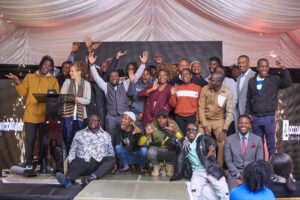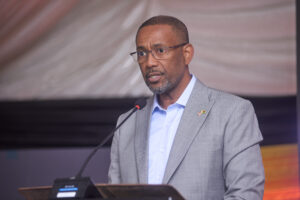NEWS
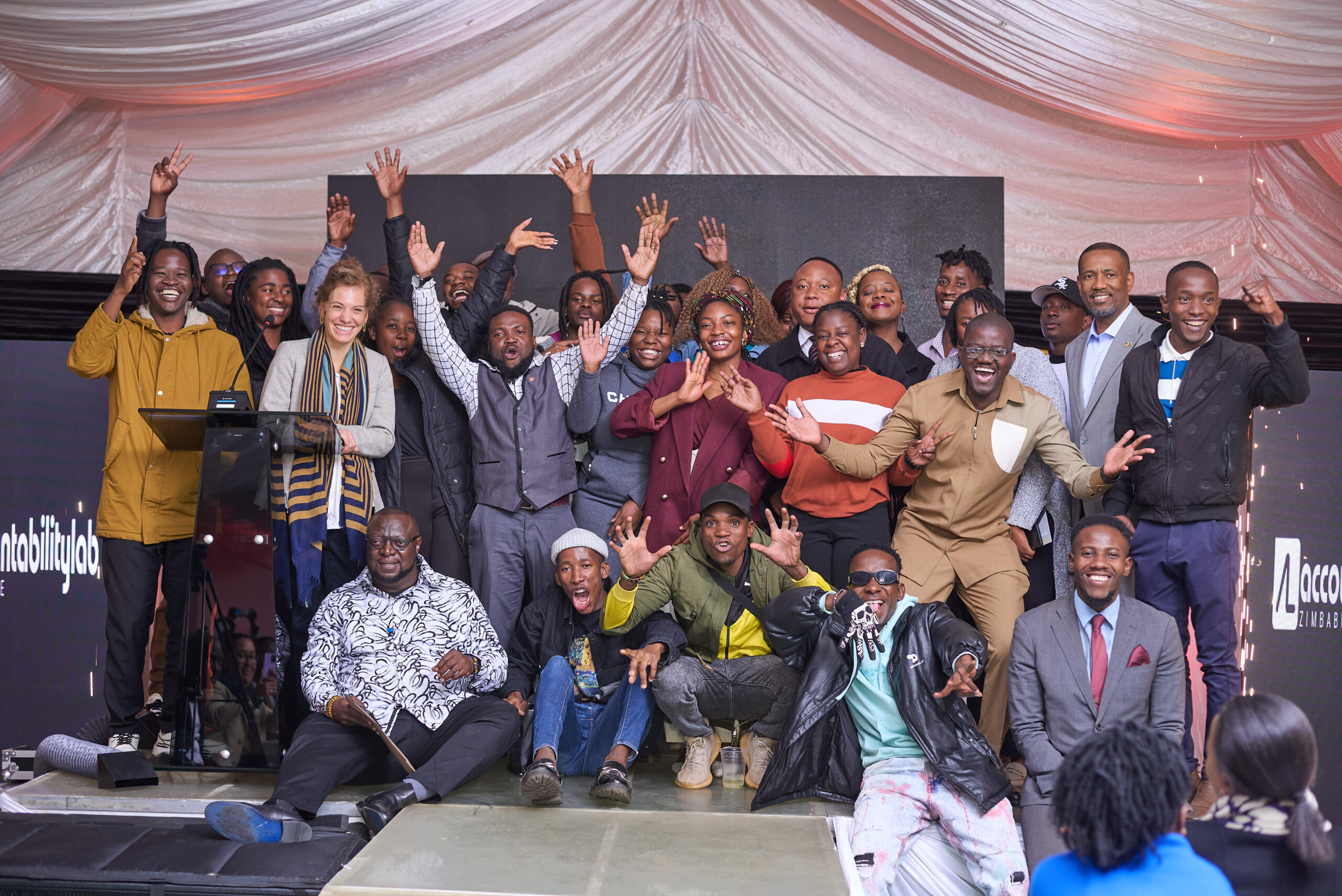
IN BRIEF
On 24 July, Accountability Lab Zimbabwe concluded the New Narratives […]
SHARE
On 24 July, Accountability Lab Zimbabwe concluded the New Narratives for Accountability in Zimbabwe (NNAZ) program with a close-out ceremony to officially communicate the close of the NNAZ Project to stakeholder, celebrate achievements and legacy, and thank the staff members who worked on the project.
Hosted at the ALZ Gardens in Harare, the event blended music, visual storytelling, and civic reflection, spotlighting the program’s bold, people-centered approach to governance reform.
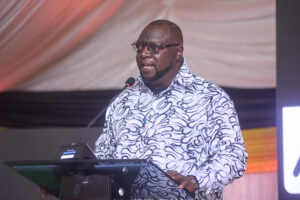
In a speech, delivered on her behalf by Accountability Lab Zimbabwe Country Director McDonald Lewanika, Ms. Sakhile Sifelani-Ngoma reflected on the NNAZ journey, which began in 2016.
“Back in 2016, a scoping mission suggested Zimbabwe was ripe for innovative accountability programming. But the context, as we all know, was delicate complex, volatile, and not quite ready, so we waited.”
She said following shifts in the political landscape and a USAID a funding opportunity from USAID, Accountability Lab launched the NNAZ Program in 2020, as a collaborative effort with Magamba Network, Kubatana, Vendors Initiative for Social and Economic Transformation (VISET), National Association of Youth Organizations (NAYO), Amandla Centre Zimbabwe, and Zvigogodza Trust. The program had a bold vision: that citizen agency, narrative change, and creative engagement could help build accountable governance from the bottom up.
The program was anchored in three Intermediate Results (IRs):
- Increased citizen engagement: through improved access to accurate local information and community problem-solving platforms like Civic Action Teams (CivActs).
- Amplified diverse voices: by supporting changemakers, especially youth, artists, and civic entrepreneurs, to develop and implement accountability solutions in new public spaces.
- Promoted good governance from within: by celebrating “positive deviants” in public service through initiatives like Integrity Icon, elevating ethical leadership within institutions.
 This results framework allowed NNAZ to go beyond conventional civil society tactics, prioritizing creative, localized, and community-owned approaches over confrontational or elite-driven models.
This results framework allowed NNAZ to go beyond conventional civil society tactics, prioritizing creative, localized, and community-owned approaches over confrontational or elite-driven models.
Over five years, the NNAZ project:
- Engaged 733,803 citizens both online and offline, through platforms like the Voice2Rep music competition, the Integrity Icon campaign, and community action forums.
- Trained 43 Accountapreneurs, emerging civic leaders launching initiatives in media, governance, and community development.
- Empowered 40 musicians and 35 filmmakers, producing 42 original songs (across four albums and one EP) and 34 short films on issues like climate justice, gender, corruption, and local governance.
- Celebrated 19 Integrity Icons, drawn from seven key ministries, for ethical public service.
- Published six policy briefs, three of which directly informed parliamentary debates or capacity-building sessions.
- Resolved real-world service delivery issues, from waste management and water access to infrastructure rehabilitation, in areas like Glen View, Chitungwiza, Mbare, and Goromonzi.
“We asked: what does it look like to hold institutions accountable with integrity and imagination?” said Dr. McDonald Lewanika, ALZ Country Director. “And more importantly, what happens when accountability becomes a shared value, not just a demand?”
From the onset, the tone of the ceremony was clear: this was not a funeral for a project but a celebration of a living legacy. The event kicked off with a curated tour of the NNAZ legacy gallery, an exhibition showcasing alumni contributions through music, visual art, and storytelling. As guests wandered through installations, ALZ staff offered personal reflections on the stories behind each display.

“As I walked through this gallery, I was filled with a sense of pride, gratitude and awe. Seeing the incredible work that’s been done over the past five years was truly humbling”, said 2023 Accountaprenuer Natalie Gwatirisa.
The ceremony then unfolded with a series of symbolic moments. Musical performances by Mystery, Mr. Moreni, and Marve Tee, alumni of the Voice2Rep program, provided a melodic thread through the evening.
One of the evening’s highlights came when outgoing USAID Deputy Mission Director Ramses Gauthier and SDC’s Liliane Tarnutzer delivered keynote addresses offering gratitude, encouragement, and continuity.
Ramses directed his remarks to the heart of the NNAZ project, its people.
“Public servants, artists, researchers, and activists who gave life to this project, you are the heartbeat of accountability in Zimbabwe,” he said. “Keep going. The work you do matters.”
His words carried the core truth: NNAZ was never just about structures or systems, it was about people actively shaping governance in their communities.
Liliane reflected on the program’s reach and influence across both digital and physical spaces.
“I was very much impressed by your online presence and convening power, not just in urban cities like Harare, but also in marginalized communities,” she noted. “I think you really did a good job.”
Her remarks affirmed NNAZ’s dual strength, its ability to mobilize communities offline while building credible digital platforms that elevated citizen voices across the country.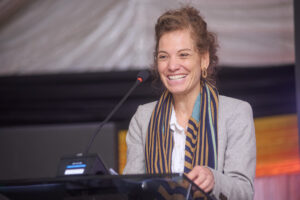
NNAZ didn’t follow the traditional civil society playbook. It blended performance, civic innovation, and narrative change to reimagine what engagement with power could look like.
Challenges including the COVID-19 pandemic, political instability, funding pressures, and a shrinking civic space, particularly leading up to the SADC Summit in 2023. But through it all, “what endured was the bravery of our alumni, the resilience of our partners, and the consistency of our purpose.”, remarked McDonald Lewanika.
The evening closed with performances from Voice2Rep and Arts for Change alumni such as Oxzy, SOX, Sthah, Lorna Real Love, and Banshee, a fitting finale to a program that believed governance could be both creative and collective.

As the formal chapter of NNAZ ends, its legacy seems far from over.
“The networks remain. The tools endure. The imagination has been kindled,” said Beloved Chiweshe, ALZ Programs and Campaigns Manager. “Now it’s up to us to carry the flame forward.
– by Bathabile Dlamini – Media and Communications Officer

